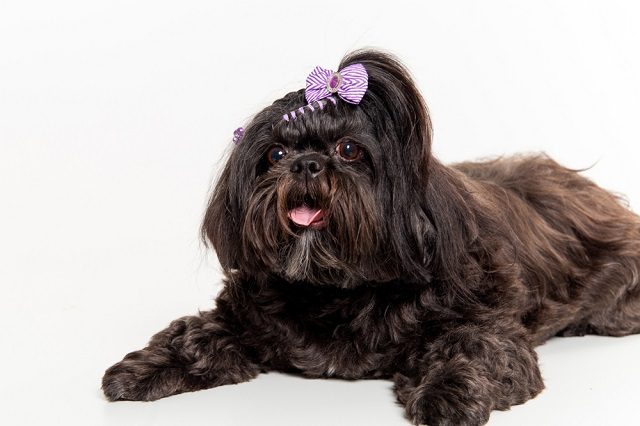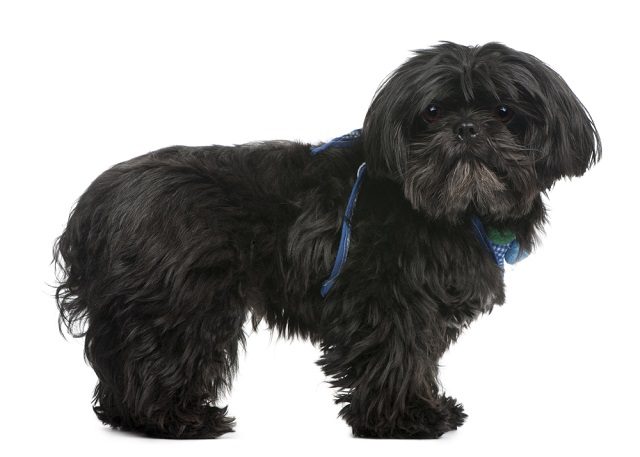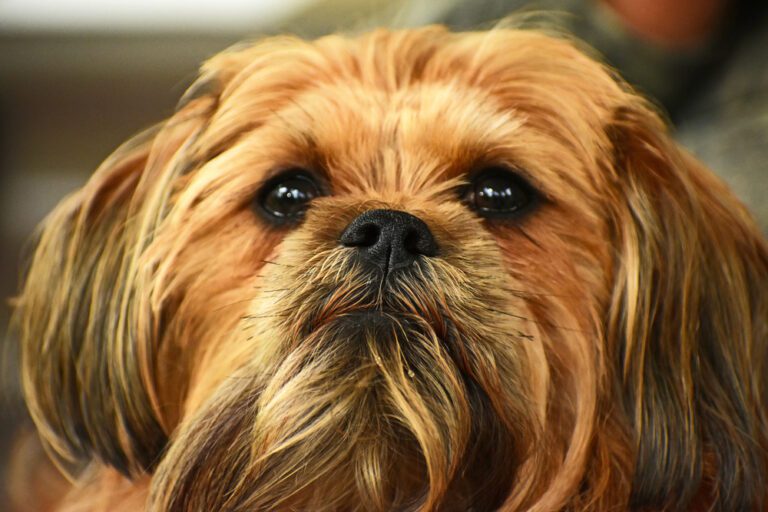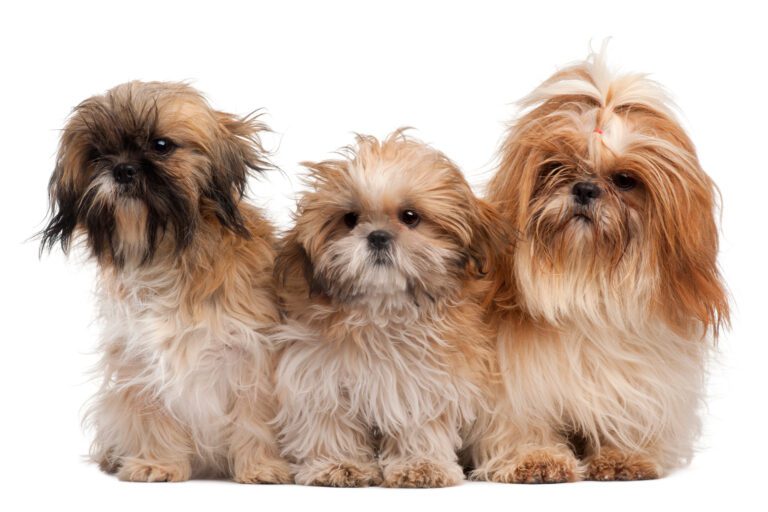Black Shih Tzu Puppy Care: Essential Tips Inside!
Caring for a Black Shih Tzu puppy extends beyond offering food and a place to sleep. Like all puppies, Black Shih Tzus has specific health needs that require attention right from the start. Tailoring health care to meet the unique requirements of a Black Shih Tzu can lead to a longer, happier life for your puppy. This tailored approach helps prevent common breed-specific issues and ensures your furry friend grows healthy and strong.
In this guide, you’ll find everything you need to know about keeping your Black Shih Tzu puppy in tip-top shape. We’ll cover their dietary needs to ensure they get all the proper nutrients, the importance of regular vet visits, and how to recognize signs of common health problems early. You’ll also learn about appropriate grooming techniques for this breed’s distinct coat, the best ways to keep them mentally and physically active, and how to handle their health through different seasons.
Our goal is simple: to provide practical, easy-to-understand information to make caring for your Black Shih Tzu puppy a joyful and rewarding experience. By the end of this guide, you’ll be well-equipped to handle the incredible responsibility of nurturing a healthy, energetic, and well-adjusted puppy.
Nutritional Needs of Black Shih Tzu Puppies
Ensuring your Black Shih Tzu puppy gets the proper nutrients is crucial for their growth and health. Like all puppies, your little friend needs a balanced diet packed with several vital nutrients:
- Protein: Essential for muscle development and recovery. Look for puppy food that lists real meat, like chicken or lamb, as the first ingredient.
- Fats: Healthy fats, such as those from fish oils, are essential for energy and help keep your puppy’s coat shiny and skin healthy.
- Carbohydrates: Whole grains or sweet potatoes provide energy and help keep your pup’s digestion regular.
- Vitamins and Minerals: These support various bodily functions. Calcium and phosphorus play critical roles in maintaining healthy bones and teeth.
When choosing a diet for your puppy, pick a high-quality food formulated explicitly for small-breed puppies. This ensures the food is dense in nutrients appropriate for its rapid growth.
Diet Tips
Feeding your Black Shih Tzu puppy isn’t just about what they eat, but also how you feed them:
- Consistency is key: Stick to the same puppy food to avoid digestive upset. If you need to change diet, do it slowly over a few days.
- Avoid human food: While giving scraps from your plate to puppies is tempting, many human foods can harm them.
- Keep fresh water available: Always have clean water for your puppy, especially after meals and playtime.
Feeding Schedule and Portion Sizes
Regular feeding times help regulate your puppy’s digestion and keep their energy levels stable:
- Under six months old: Feed your puppy four small meals a day.
- Six to twelve months old: You can reduce feeding to three times daily.
- After twelve months: Most dogs do well with two meals a day.
The amount of food your puppy needs varies based on age, size, and activity. You can start with the recommendations on the puppy food package but adjust as needed based on whether your puppy seems hungry or is gaining too much weight. Checking with your vet if you’re unsure about the right amount is a good idea.
Monitoring your puppy’s growth and adjusting its food intake accordingly is essential to prevent obesity, which can lead to health issues as it grows.
By understanding and meeting the nutritional needs of your Black Shih Tzu puppy, you help ensure they grow into a healthy, happy adult dog. Remember, a well-fed puppy is an energetic and playful companion who brings joy to your life!
Routine Veterinary Care for Black Shih Tzu Puppies
Taking your Black Shih Tzu puppy for regular veterinary check-ups is essential. These visits are not just for when your puppy seems sick. Routine check-ups help catch health issues before they become serious, ensuring your puppy grows healthy and strong.
Think of these visits as your puppy’s health audits. The vet will check their weight, listen to their heart, and look over their coat and teeth. These check-ups are also great for asking questions about your puppy’s behavior, diet, or care. Plus, seeing the vet regularly helps your puppy become comfortable with these visits, making it less stressful for them and you!
Vaccination Schedule and Preventable Diseases
Immunizations play a crucial role in maintaining your puppy’s health. They protect your little one from various dangerous diseases. Here’s an indispensable guide for what your puppy needs:
- At 6 to 8 weeks: Administer the initial DHPP vaccine, covering distemper, hepatitis, parvovirus, and parainfluenza.
- 10 to 12 weeks: Second round of DHPP and vaccine for leptospirosis.
- Between 16 to 18 weeks: Administer the third DHPP vaccination and boosters for rabies and leptospirosis.
- 12 to 16 months: DHPP booster, rabies booster.
This vaccination timeline can change based on your location and your veterinarian’s recommendations. Always follow your vet’s recommended schedule to protect your puppy.
Vaccinations are crucial for protecting against serious diseases such as distemper and rabies. By adhering to a vaccination schedule, you’re not just protecting your puppy; you’re also keeping other animals and people safe.
Regular vet visits and vaccinations are critical to a long, happy life for your Black Shih Tzu puppy. Remember, a healthy puppy is a happy companion, ready to play and cuddle with you daily!
Health Issues in Black Shih Tzu Puppies
Black Shih Tzus can be prone to specific genetic health issues like all Shih Tzus. It’s important to know what these are so you can watch for signs and get your puppy the help they need early on. Here are some common problems associated with this breed:
- Brachycephalic Syndrome: Because of their cute, flat faces, Shih Tzus can have breathing problems. This can make breathing hard for them, especially when they are hot or excited.
- Hip Dysplasia occurs when the hip joints don’t fit together perfectly, which can lead to arthritis or discomfort as your puppy grows.
- Eye Issues: Their large, beautiful eyes are prone to dry eye, progressive retinal atrophy, and cataracts.
Knowing these risks helps you understand what to watch for as your puppy grows.
- Brachycephalic Syndrome: Because of their cute, flat faces, Shih Tzus can have breathing problems. This can make breathing hard for them, especially when they are hot or excited.
- Hip Dysplasia occurs when the hip joints don’t fit together perfectly, which can lead to arthritis or discomfort as your puppy grows.
- Eye Issues: Their large, beautiful eyes are prone to dry eye, progressive retinal atrophy, and cataracts.
Knowing these risks helps you understand what to watch for as your puppy grows.
Signs and Symptoms of Common Illnesses
Early signs of illness can significantly affect how well your puppy recovers. Here are several key symptoms to watch for:
- Breathing Issues: If your puppy is wheezing, coughing, or seems to struggle to catch their breath, especially after play or in hot weather, it could be a sign of a respiratory issue.
- Limping or Difficulty Moving: This could be a sign of hip dysplasia. If your puppy seems in pain when moving or doesn’t want to play like usual, it’s time for a vet visit.
- Eye Problems: Watch for redness, cloudiness, or your puppy rubbing their eyes. Eye issues can quickly worsen, so checking any eye problems immediately is essential.
Seeing your puppy sick can be scary, but knowing these signs helps you act quickly. Quick action and treatment can often lead to a better outcome for your furry friend.
Understanding genetic predispositions and recognizing the signs of common illnesses can help ensure your Black Shih Tzu puppy has a healthy and joyful life. Frequent veterinary checkups and diligent care at home are essential for maintaining the health and happiness of your cherished puppy.
Grooming and Skin Care for Black Shih Tzu Puppies
Grooming your Black Shih Tzu puppy is not just about keeping it looking cute—it’s essential for its health.
- Fur: Brush your puppy’s fur daily to prevent tangles and mats. This daily routine keeps their coat shiny and healthy and gives you particular bonding time with your pup. Use a soft brush that’s gentle on their skin.
- Nails: Trim their nails once a month to prevent discomfort and mobility issues. If you hear their nails tapping on the floor, it’s time for a trim—they’re too long!
- Teeth: Brush their teeth several times a week with toothpaste made for dogs. This helps prevent dental problems, which can affect their overall health.
These grooming steps are essential. They keep your puppy comfortable and help prevent health problems later on.
Managing Skin Issues and Maintaining a Healthy Coat
Black Shih Tzus can have sensitive skin that needs extra care to stay healthy. Here are some tips to manage common skin issues:
- Bathing: Bath your puppy once a month with a gentle dog shampoo to keep their skin clean without drying it out. They might need a special shampoo if they seem itchy or their skin looks irritated. Your vet can recommend one.
- Diet: What your puppy eats affects their skin and coat. Foods rich in omega-3 fatty acids can help keep their coat shiny and skin healthy.
- Check for Parasites: Fleas and ticks can cause severe skin problems. Regular checks and preventive treatments are essential to keep these pests away.
If you notice any redness or bald patches, or if your puppy is scratching a lot, it’s essential to see the vet. These could be signs of a skin problem that needs treatment.
Following these grooming and skincare tips, you can keep your Black Shih Tzu puppy looking and feeling their best. Regular grooming not only helps your puppy stay comfortable, but it also strengthens the bond between you. Keep in mind that a puppy that is groomed regularly is both happier and healthier!
Exercise Requirements for Black Shih Tzu Puppies
Exercise is crucial for your Black Shih Tzu puppy, not just for their physical health but also for their mental well-being. Here’s how to tailor exercise to their age:
- 8 to 12 Weeks Old: Focus on short, gentle play sessions—about 5 to 10 minutes, several times daily. Indoor play with soft toys is perfect for this stage.
- 3 to 6 Months Old: Gradually increase playtime to 15 to 20 minutes, and you can start introducing outdoor walks on a leash.
- 6 Months to 1 Year: Your puppy has more energy at this stage. You can extend walks to 20 to 30 minutes and include more interactive games like fetch.
Match the exercise to your puppy’s age to keep it safe and happy. Always watch for signs that your puppy is getting tired, like slowing down or panting heavily, and let it rest.
Safely Exercising Your Puppy
To protect your Black Shih Tzu from joint problems, exercise them carefully:
- Soft Surfaces: Play on grass or other smooth surfaces to reduce the impact on their joints.
- Avoid Stairs and Jumping: Limit activities that put too much pressure on your puppy’s joints, such as jumping and running up and down stairs.
- Regular, Gentle Exercise: Instead of occasional, intense exercise, aim for regular, gentle activities. This helps strengthen their muscles without straining their joints.
If your puppy limps or avoids using a leg, it’s a sign that something may be wrong. Stop the activity and consult your vet to ensure they’re okay.
Understanding and implementing these exercise guidelines can help your Black Shih Tzu puppy grow into a healthy, active adult dog. Exercise is also a great way to bond with your puppy and instill good habits early on. So, keep it fun and safe for both of you!
Mental Health and Socialization for Black Shih Tzu Puppies
Socialization and mental stimulation are crucial to developing a well-rounded, happy Black Shih Tzu puppy. Starting early helps them feel confident and comfortable in different situations as they grow.
- Build Confidence: Gradually introduce your puppy to people, environments, and other animals. This approach will enhance confidence and minimize fear and anxiety in unfamiliar situations.
- Prevent Behavior Problems: Good socialization can prevent many common behavior problems, such as aggression and excessive barking.
Think of socialization as the foundation for your puppy’s emotional well-being. It’s as important as their physical health!
Tips on Training and Socialization Activities
Training and socialization should be fun and rewarding for you and your puppy. Here are some practical ways to socialize and stimulate your Black Shih Tzu puppy:
- Puppy Classes: Enroll in puppy classes. These are great for socialization with other dogs and people, and they teach basic obedience skills.
- Daily Walks: Take walks in different neighborhoods and parks. This exposes your puppy to various sights, sounds, and smells.
- Playtime with Friends: Arrange playdates with other vaccinated dogs. Ensure the other dogs are friendly and well-behaved, giving your puppy a positive experience.
- Training Games: Use training games to teach commands and tricks. This not only trains them but also provides mental exercise. Simple games like ‘fetch’ or ‘hide and seek’ with treats can be engaging.
- Calm Exposures: Introduce your puppy calmly to new experiences, like the sound of traffic or being around children. Keep these encounters short and positive.
The goal is to make every new experience positive. If your puppy seems overwhelmed, take a step back and go slower. Reward them with treats and praise to make these experiences something they look forward to.
Focusing on socialization and mental stimulation, you help ensure your Black Shih Tzu puppy grows into a friendly, well-adjusted dog. It’s a rewarding journey that immensely strengthens your bond and enhances your puppy’s life!
Preventative Measures and Regular Health Checks for Black Shih Tzu Puppies
Preventive care is crucial for keeping your Black Shih Tzu puppy healthy throughout their life. Here are vital steps to take:
- Routine Veterinary Check-ups: Plan to visit your vet annually. These check-ups help identify and address health issues before they escalate.
- Vaccinations: Keep up with your puppy’s vaccination schedule. Vaccines protect them from various diseases.
- Parasite Control: Use flea and tick prevention as recommended by your vet.
- Diet and Exercise: Feed your puppy a balanced diet suited to their age, breed, and health needs. Combined with regular exercise, this keeps them fit and prevents obesity, which can lead to health issues.
- Dental Care: Brush your puppy’s teeth regularly and consider dental treats that help clean and freshen their breath.
These preventive measures can save you and your puppy from future health troubles and vet bills. They are an investment in a long, happy life together.
Regular Health Checks at Home
Keeping an eye on your puppy’s health at home is easy with these simple checks:
- Skin and Coat: Once a week, check their skin and coat for any signs of fleas, ticks, or skin irritations. Healthy skin should be free of scabs, redness, or flaking.
- Eyes and Ears: Check your puppy’s eyes and ears for discharge or a bad smell. Clear eyes and clean ears without too much wax or gunk are signs of good health.
- Teeth and Gums: Check their mouth for bad breath, red gums, or brownish teeth. These can be signs of dental issues.
- Behavior: Watch how your puppy acts each day. Changes, like not eating, hiding, or being less playful, can signal that it’s not feeling well.
Integrating these preventative care measures and regular health checks into your routine lets you set your Black Shih Tzu puppy up for a healthy life. Remember, the more you know about your puppy’s health, the better you can care for them. And seeing them happy and healthy is the best reward of all!
Seasonal Care for Black Shih Tzu Puppies
With each season, the requirements of your Black Shih Tzu puppy may vary. Keeping them comfortable and healthy year-round means adjusting your care routine to suit the weather. Here’s how:
- Spring and Fall: These seasons are often mild, but watch for sudden weather changes that could catch your puppy off guard. Have a light jacket ready for chillier days.
- Summer: Heat can be harsh on your Shih Tzu due to their thick fur and short noses. Always provide plenty of water and shady spots to cool down. Avoid your puppy to walk on during the hottest parts of the day.
- Winter: Cold weather can be harsh, especially for a small breed like the Shih Tzu. Keep your puppy warm with a cozy sweater or coat during walks, and ensure it has a warm bed away from drafts.
Adjusting to each season ensures your puppy stays comfortable, whether playing in the leaves or napping in the summer shade.
Special Considerations for Colder and Warmer Months
Each season presents unique challenges that need careful consideration:
- Colder Months:
- Warmth: Always make sure your puppy has a warm place to sleep. A soft, insulated bed away from drafts will help keep them snug.
- Skin Care: Winter air can dry out their skin. Consider a humidifier in the room where they sleep and keep up with regular grooming to prevent matting and maintain skin health.
- Outdoor Safety: Ice-melting chemicals on roads and sidewalks can irritate your puppy’s paws. Wash their feet after walks to remove these chemicals.
- Warmer Months:
- Hydration: Keep your puppy hydrated. Offer fresh water at all times and bring a portable water dish on walks.
- Cooling Down: Use fans, air conditioning, and cooling mats to help your puppy beat the heat.
- Sun Protection: Dogs can get sunburned, too. When your pet spends significant time outside, use pet-safe sunscreen on their noses and ears.
Seasonal care is all about anticipation and prevention. Preparing for each season’s challenges ensures your Black Shih Tzu puppy enjoys a happy, healthy year. Plus, adapting to their needs helps strengthen the bond between you, showing them they can always rely on you, no matter the weather.
Troubleshooting and When to Seek Veterinary Help for Black Shih Tzu Puppies
Knowing when your Black Shih Tzu puppy faces an emergency can save their life. Here are some signs that mean you should seek veterinary help immediately:
- Difficulty Breathing: It’s urgent if your puppy is gasping, choking, or unable to breathe normally.
- Severe Vomiting or Diarrhea: Repeated vomiting or diarrhea, especially with blood, can quickly lead to dehydration.
- Unusual Lethargy: If your ordinarily playful puppy is suddenly exhausted and unresponsive, it could indicate a severe problem.
- Injury: Any visible injury, like cuts, limping, or difficulty moving, needs immediate attention.
- Eating Something Toxic: If you know or suspect your puppy has eaten something harmful (like chocolate, xylitol, or poisonous plants), don’t wait for symptoms to appear.
These situations are serious and require quick action. Always have your vet’s phone number and the number of a nearby emergency vet clinic handy.
Handling Common Emergencies Before Reaching a Vet
While your first step should always be to call your vet if you think it’s an emergency, here are some measures you can take to help your puppy:
- Choking: If your puppy is choking and can’t breathe, you may need to look inside its mouth to see if you can safely remove the object. Be careful—a distressed animal may bite.
- Vomiting/Diarrhea: Do not give your puppy food or water until you’ve spoken with a vet, as it could worsen things.
- Bleeding: If your puppy is bleeding, gently pressure the wound with a clean cloth to slow the bleeding.
- Poisoning: If you know what they’ve consumed, take any relevant packaging to the vet or be prepared to describe the substance.
In any emergency, keep calm and speak soothingly to your puppy as you prepare to transport them to the vet. Your calmness can help keep them from panicking, which can worsen their condition.
Knowing how to recognize and initially respond to emergencies can significantly improve the outcome for your Black Shih Tzu puppy. Prompt action and staying calm are your best tools in an emergency.
Conclusion
Caring for your Black Shih Tzu puppy requires a thoughtful approach that spans nutrition, regular vet visits, grooming, appropriate exercise, mental stimulation, and understanding seasonal needs. It’s essential to recognize and promptly respond to any health emergencies. By proactively managing these aspects of your puppy’s care, you ensure their physical and emotional well-being and strengthen your bond. Stay attentive and responsive to their needs, and you’ll lay a strong foundation for a joyful and fulfilling relationship with your furry friend.
FAQ,s
What is the best diet for a Black Shih Tzu puppy?
A balanced diet of proteins, fats, and essential nutrients formulated explicitly for small-breed puppies is ideal. Look for high-quality dog foods where real meat is the primary ingredient.
How often should I take my Black Shih Tzu puppy to the vet?
Schedule a vet visit every three to four months during their first year for routine check-ups and vaccinations. Following their first year, annual veterinary check-ups are generally adequate unless specific health issues exist.
What are the signs that my Black Shih Tzu puppy may need emergency care?
Watch for symptoms like difficulty breathing, severe vomiting or diarrhea, unexpected lethargy, or any signs of pain such as limping or whining. If these signs are observed, immediate veterinary consultation is recommended.
How can I safely socialize my Black Shih Tzu puppy?
Start by gradually introducing your puppy to new people, places, and other pets. Puppy classes and controlled playdates with other vaccinated dogs can be very beneficial.
What specific grooming needs does a Black Shih Tzu puppy have?
Regular brushing to avoid tangles, frequent baths using mild shampoo, nail clipping, and dental maintenance are crucial.. Also, keep the fur around their eyes trimmed to avoid irritation.










